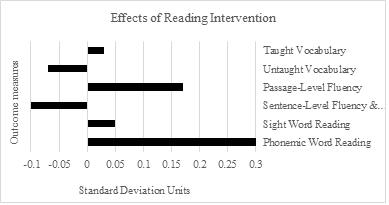Effects of a Reading Intervention and Mentoring Intervention for Ninth-Grade English Learners with Reading Difficulties
Sharon Vaughn, Leticia Martinez, Kelly J. Williams, Jeremy Miciak, Anna-Maria Fall, & Greg Roberts
PDF Version
How does an intensive reading intervention affect the reading achievement of ninth-grade English learners with reading difficulties?
Some English learners (ELs) in ninth grade have difficulty comprehending grade-level text, preventing them from learning content in other subject areas. To address this we implemented an intensive, multicomponent reading intervention for one year with ninth-grade ELs with reading difficulties. The intervention was provided in addition to core instruction and focused on word-reading, fluency, vocabulary, comprehension. Foundational skills and strategies were taught through explicit instructional methods, and students worked in cooperative learning groups to apply these skills and strategies to content area texts. ELs who received the reading intervention performed better on some measures of reading achievement (sentence-level fluency and comprehension, taught vocabulary words) than ELs who did not receive the reading intervention. On other measures, there were not substantial differences between the two groups (word-reading, untaught vocabulary words, and text comprehension).

How does a mentoring intervention affect school engagement for ninth-grade English learners?
We also implemented a mentoring intervention, a modified version of the Check & Connect model, which aimed to reduce students’ risk of dropout through school engagement. We compared the performance of ninth-grade ELs with reading difficulties who received the mentoring intervention for one year to those who did not. We found the intervention did not have any meaningful effect on students’ attendance, course failures, disciplinary referrals, or self-reported engagement.
How did context affect the findings?
We hypothesize that multiple contextual factors played a significant role in the impact of the interventions. The participating schools faced numerous challenges (e.g., high poverty, frequent absences, resources, a hurricane) which increased students’ risk for reading difficulties and disengagement. It may be that that intensive interventions in isolation could not adequately compensate for the increased risk associated with multiple uncontrollable factors. Under these conditions, students likely require school and community supports over multiple years to address their social and academic needs.
How did we do this study?
We recruited 623 ninth-grade students identified as ELs with reading difficulties from three urban high schools in the Southwestern United States. At each school, eligible students were randomly assigned to one of four groups: 1) the reading intervention for adolescents (RIA), 2) a mentoring intervention (MI), 3) the RIA + MI, or 4) a comparison condition (no interventions). Each intervention’s effects were estimated by comparing the outcomes of students who were offered the intervention to those were not offered the intervention.
Full Article Citation:
Vaughn, S., Martinez, L., Williams, K. J., Miciak, J., Fall, A.-M., Roberts, G. (2021). Effects of a reading intervention and a mentoring intervention for ninth-grade English learners with reading difficulties. Journal of Research on Educational Effectiveness. http://dx.doi.org/10.1080/19345747.2021.2009071
